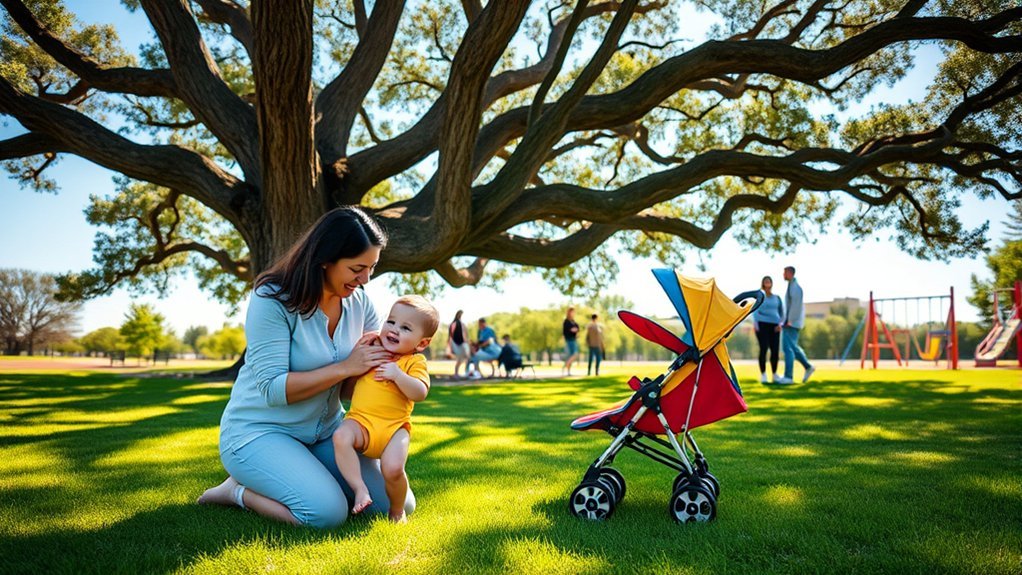When considering outdoor play for your infant, it’s crucial to weigh the benefits against various challenges. Sensory exploration and developmental growth are important, yet numerous factors such as weather conditions, urban settings, and safety concerns can complicate outdoor experiences. Understanding these influences can help you make informed decisions about your baby’s playtime. What might be the best approach to guarantee your child enjoys safe and enriching outdoor activities amidst these challenges?
Importance of Outdoor Play for Infants
When you take your infant outside, you’re not just enjoying fresh air; you’re also fostering important developmental milestones.
Outdoor play stimulates your baby’s senses, encouraging visual and auditory development as they encounter new sights and sounds. The varied textures of grass, sand, or leaves enhance tactile experiences, promoting sensory exploration.
Outdoor play enhances your baby’s senses, promoting visual, auditory, and tactile exploration through new experiences in nature.
Additionally, exposure to natural light supports healthy sleep patterns and vitamin D synthesis, essential for bone health.
Social interactions with other children or caregivers during outdoor activities also nurture emotional and social skills. You’re helping your infant develop confidence and curiosity while they explore their environment.
Environmental Factors Affecting Outdoor Play
While outdoor play offers numerous benefits for your infant, various environmental factors can greatly influence these experiences. Understanding these factors can help you create a safe and stimulating environment.
| Environmental Factor | Impact on Outdoor Play |
|---|---|
| Weather Conditions | Extreme temperatures can limit time spent outdoors. |
| Urban vs. Rural Areas | Urban settings may have fewer green spaces. |
| Air Quality | Poor air quality can affect your infant’s health. |
| Safety of Play Areas | Unsupervised or unsafe areas pose risks. |
| Availability of Resources | Limited access to toys or parks can hinder play. |
Parental Concerns and Anxiety
As you consider the benefits of outdoor play for your baby, it’s natural to feel a mix of excitement and anxiety about the potential risks involved. You might worry about accidents, exposure to harsh weather, or the presence of allergens.
These concerns often stem from a desire to protect your child and guarantee their well-being. It’s important to recognize that some level of risk is inherent in any outdoor activity, but proper preparation can mitigate these dangers.
Access to Safe Outdoor Spaces
Access to safe outdoor spaces is vital for your baby’s development and well-being. Being outdoors promotes physical activity, encourages exploration, and enhances sensory experiences, all essential for cognitive and motor skills.
However, not all families have equal access to these spaces. Urban areas may lack parks or safe play zones, while rural families might struggle with distance to safe environments. Additionally, safety concerns about crime or traffic can deter outdoor play.
To guarantee your baby benefits, seek out local parks, community play areas, or backyards that offer a secure environment. Advocating for improved access to safe outdoor spaces can also foster community engagement, benefiting not just your child but other families as well.
Prioritize outdoor play to nurture your baby’s growth.
Cultural Attitudes Toward Outdoor Play
Cultural attitudes toward outdoor play greatly influence how families engage with their children in outdoor environments. Understanding these perspectives can help you foster a positive relationship with outdoor activities.
Here are three key attitudes that shape outdoor play:
- Value of Independence: Many cultures emphasize the importance of allowing children to explore and learn through unstructured play.
- Safety Concerns: In some communities, fears related to safety can hinder outdoor play, creating a preference for indoor activities.
- Connection to Nature: Cultures that prioritize environmental appreciation often encourage outdoor play as a means to instill respect for nature.
Frequently Asked Questions
What Age Is Appropriate for Taking Babies Outdoors?
You can start taking your baby outdoors as early as two months old. Make certain they’re dressed appropriately for the weather, and always monitor their comfort and safety while enjoying fresh air and natural surroundings.
How Long Should Babies Play Outside Each Day?
Think of outdoor play as sunshine for your baby’s development; aim for about 30 minutes daily. This helps foster physical skills and emotional well-being, but always pay attention to weather conditions and your baby’s comfort.
What Gear Is Necessary for Outdoor Play With Infants?
You’ll need essentials like a sun hat, lightweight clothing, sunscreen, and a sturdy stroller or carrier. Make certain you have water, snacks, and a blanket for comfort. These items keep your infant safe and happy outdoors.
Are There Specific Weather Conditions to Avoid?
Extreme temperatures, heavy rain, or high winds are conditions to avoid. These weather scenarios can pose risks to your baby’s safety and comfort, leaving you both vulnerable. Always check forecasts before heading outdoors for play.
How Can I Engage My Baby During Outdoor Play?
You can engage your baby outdoors by using colorful toys, singing songs, or playing simple games. Interaction fosters sensory development and strengthens your bond, making outdoor experiences enjoyable and enriching for both of you.
Conclusion
In summary, while outdoor play offers crucial benefits for your infant’s development, various environmental and societal factors can hinder these experiences. Remember, “all work and no play makes Jack a dull boy.” It’s important to advocate for safe, accessible spaces that encourage exploration and growth. By addressing your concerns and seeking supportive environments, you can help your child fully engage with the world around them, ensuring they reap the rewards of outdoor play for their overall well-being.
